Business & Management
Address Financial Literacy to Improve Household Income-Study
Published
4 years agoon
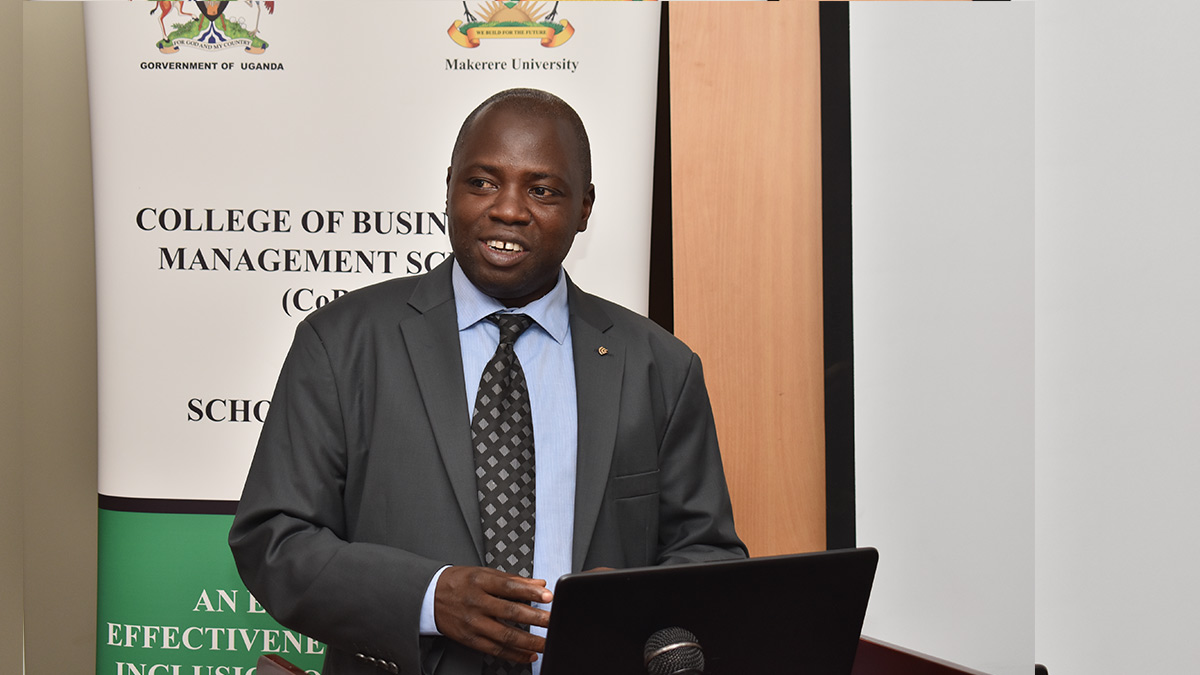
Findings by a team of researchers from the College of Business and Management Sciences (CoBAMS) have recommended that the Government through its agencies should partner with private financial institutions to organise financial literacy trainings to teach households on how to access capital, save and invest in productive ventures. The recommendations were made at a research dissemination workshop for the project titled: Evaluation of the effectiveness of financial inclusion on household’s welfare in Uganda: A case study of Busoga region.
While officially opening the hybrid dissemination workshop held on Wednesday 29th September 2020 in the School of Business Conference Room and virtually, the Principal CoBAMS, Dr. Eria Hisali thanked the Government of Uganda for funding the project through the Makerere University Research and Innovations Fund (Mak-RIF). He equally commended the Principal Investigator (PI), Dr. Eric Nzibonera and his team on successfully completing their project and achieving the set objectives.
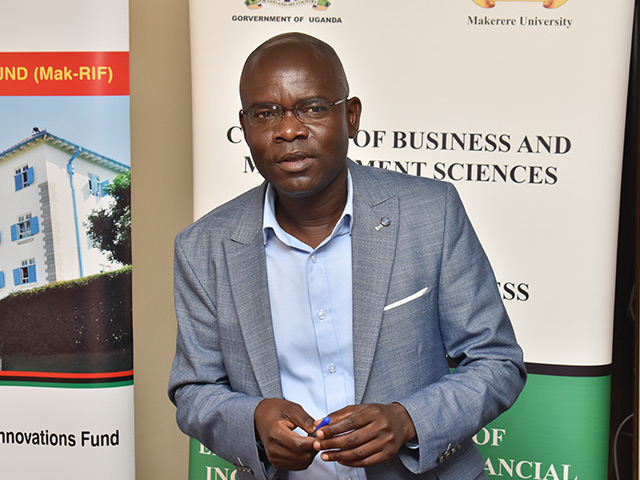
Dr. Hisali proposed four options to ensure that the findings from the study reach a wider audience.
- Immediately upload the findings on the College’s new working paper series website, which will enable staff to read the document and provide feedback
- Proceed to transform the working paper into a journal article so as to reach audiences from different parts of the world
- Proactively review curricular in preparation for the possibility of gradually using research from Makerere as part of course outlines and teaching materials.
- Take advantage of the College’s planned framework of engaging policy makers formally through policy labs that will be held every quarter.
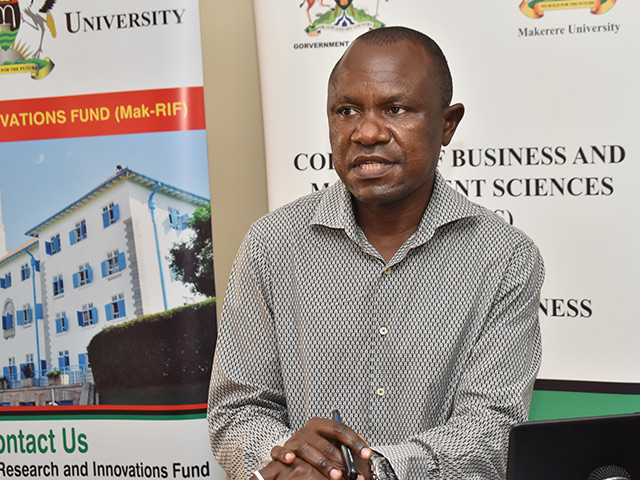
Presenting the findings from the project, the PI Dr. Nzibonera thanked the Principal for his advice and his research team for their hard work. Other members of the team that sampled 430 heads of households included the Dean School of Business Dr. Godfrey Akileng and Ms. Hellen Nambi.
“Financial Inclusion is a process through which financial services are delivered to the disadvantaged and low-income sections of the society on a timely basis and at affordable costs” defined Dr. Nzibonera, adding that “the relationship between financial inclusion and poverty alleviation has been widely discussed but only few studies explore the effect of financial inclusion on household welfare.”
He therefore shared the twofold objective of the project as; to establish the extent to which the rural households engage in financial inclusion and to examine the nature of household welfare and establish the extent to which financial inclusion enhance households’ welfare. The latter, he noted, would help guide policy recommendations to the Government and private sector.
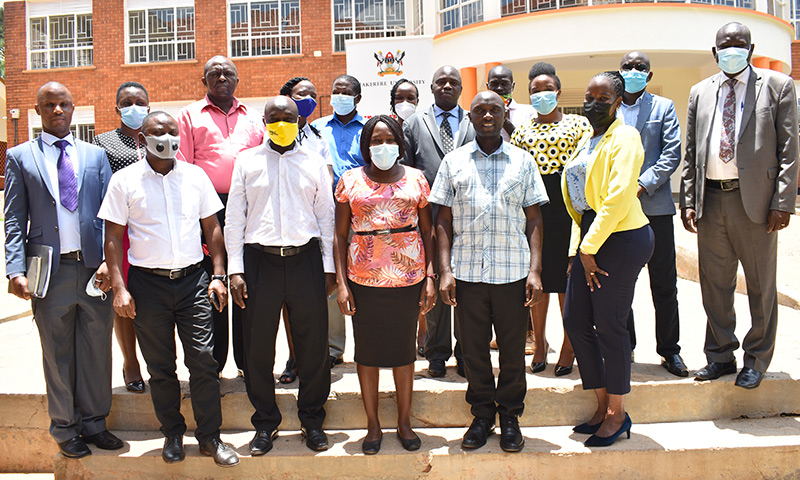
Dr. Nzibonera noted that financial inclusion is measured through establishing the extent of availability and accessibility to financial services, affordability, usage and quality of financial products. He added that household welfare is improved through access to quality education and health services, improved shelter, food production and consumption as well as access to information.
The findings on availability and accessibility to financial services revealed an interesting pattern. “Whereas households still find it hard to access formal financial services for savings and deposits’ and services provided by bank agents are irregular, they easily access mobile money services for withdrawals and payments” he shared.
In terms of affordability, findings revealed that although the cost of accessing financial institutions and withdrawing funds from mobile money agents is still high, the cost of accessing financial services through bank agents and carrying out financial transactions through financial institutions is affordable.
Investigations into the usage and quality of services showed that households find it easy to use mobile money and village SACCOs to make deposits and payments for school fees. Despite the ease of use, households find it hard to save with banks, microfinance institutions and SACCOs.
“The accounts opened in banks and SACCOs are not frequently used and the services offered by banks or their agents are not regular” added Dr. Nzibonera.
The research team’s findings showed that financial inclusion has partly enhanced the welfare if households in Busoga.
“The study revealed improvement in income levels as a result of accessing loans from financial institutions and SACCOs. The number of school going children has also increased as a result of borrowing opportunities from SACCOs” said the PI.
Dr. Nzibonera added that although it is easy for households to access information about financial services relevant for welfare improvement, “there is limited income to enable households gain access to good healthcare and carry out construction.”
The team therefore made the following policy recommendations;
- Financial and microfinance institutions should employ agents to at least every parish or sub-county to grant households easy access to financial services.
- Government through District commercial officers should encourage households to organise into village savings and credit cooperative organisations (SACCOs) at parish level and identify unique financial products that promote savings and investments for different groups.
- Government agencies such as the Micro Finance Support Centre and Operation Wealth Creation (OWC) should partner with private financial institutions to organise financial literacy trainings for households on how to save as well as identify and invest in productive investment ventures.
- The cost of financing should be reduced to rates that are affordable by households. This will improve household income for both consumption and investment.
- Financial institutions should design financial products that would enable households to access funds for construction as long as there is a clear payment plan and evidence of source of income for loan repayments.
Speaking on behalf of the Mak-RIF Grants Management Committee (GMC) Chairperson Prof. William Bazeyo, Dr. Helen Nambalirwa Nkabala congratulated the research team upon the successful dissemination and thanked Dr. Hisali for proposing policy labs as a means of engaging policy makers.
She urged Dr. Nzibonera as a firsthand witness on the state of financial inclusion to go beyond the policy recommendations and draft a successor project proposal on solutions that can clearly and precisely take financial inclusion at the grassroots level to the next level.
“You are the right people to guide Government on what unique product the community will get and how it will help improve their financial knowledge” she recommended.
Dr. Nkabala thanked the Government for funding research and innovations that inform national development priorities and the University Management for creating an environment conducive to conducting research. In the same breath she thanked the GMC for providing oversight and the GMC Secretariat for ensuring that the projects run smoothly.
“This is a clear example of taking the Ivory Tower to the community” she concluded.
Representing Mr. John Peter Mujuni, Executive Director, Microfinance Support Centre (MSC) and Chief Guest at the dissemination, Mr. Godfrey Mangeni thanked the research team for a job well done, and pledged take the findings and policy recommendations very seriously.
“Please share these findings so that we can work with you in other areas like Bukedi and Karomoja to improve our services” he remarked.
Mr. Mangeni shared that there still remains a lot of work to be done to support Government’s Parish Development Model in the Busoga region despite MSC’s zonal office in Jinja and a satellite office in Iganga and as such, called upon researchers from Makerere to share their expertise.
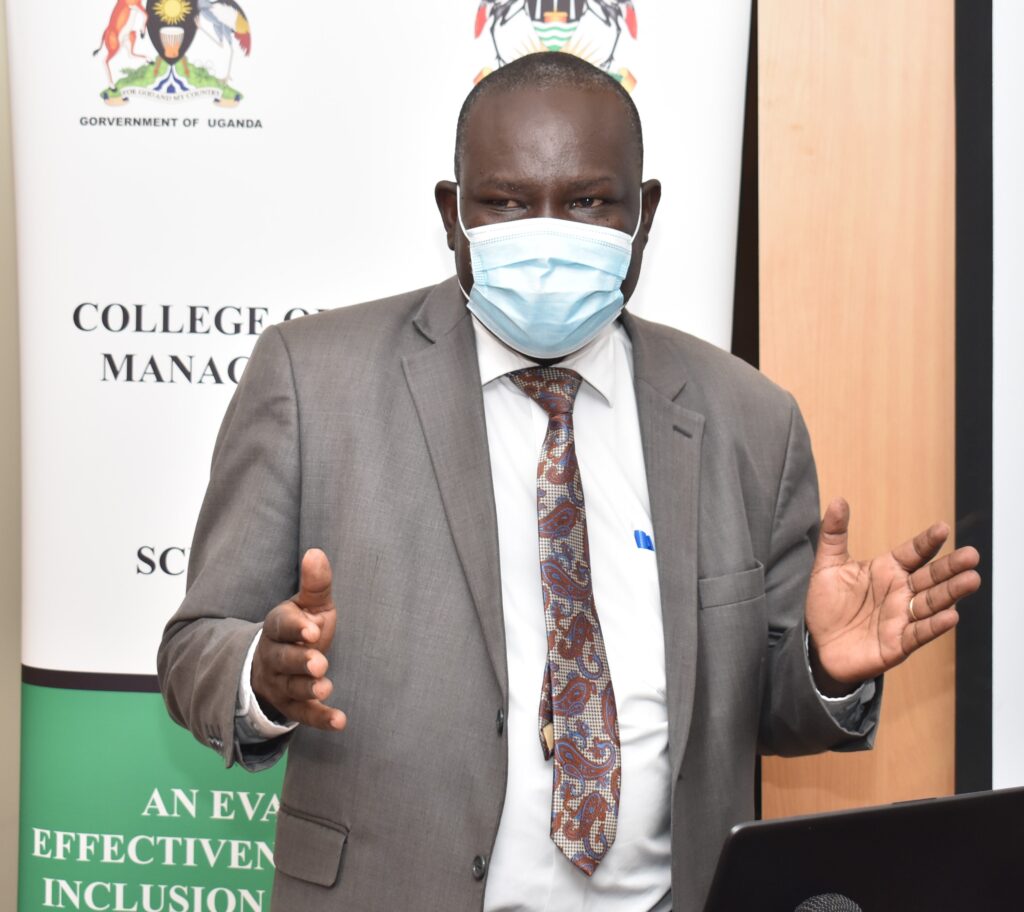
Delivering the concluding remarks, Dr. Akileng in his dual capacity as Research Team member and Dean noted that Financial Inclusion is an important topical issue for national development and therefore expressed happiness that the Government had found it fitting to fund the project.
“As a nation, we need to reflect reflect on Government interventions aimed at addressing gaps of financial inclusion that financial institutions have not been able to fill” he rallied. This reflection, he said, ought to be guided by the question ‘Where have been the successes in social impact and where have been the failures?’
He noted that although Financial Technology (FINTECH) is the buzzword when it comes to improving service delivery, its success is hinged on how easy it will be for end-users at the grassroots level to adopt the various solutions offered.
“I believe that a highly informed community with the ability to easily access financial services and mobilise savings is key to the improvement of household earnings as well as boost demand and productivity in the country” he added.
In the discussion that preceded the concluding remarks, Mr. John Emoi, the Manager Investments at Uganda Development Bank who joined the conversation virtually had expressed his organisation’s keen interest in the days topic and research findings. Particularly, he had urged the research team to include the development of FINTECH models as a means of disseminating financial services among their policy recommendations.
In conclusion, Dr. Akileng called for affirmative action for business teaching institutions, “Business touches every sector and it is important to appreciate that if we must make money in any sector, we must understand business.”
You may like
-


Makerere Explores Strategic Industry Partnership with Psalms Food Industries to Strengthen Manufacturing Innovation
-


Makerere Graduation Underscores Investment in Africa’s Public Health Capacity
-


Botswana Delegation Visits Makerere’s Public Investment Management Centre to Study Sustainable Training Model
-


Makerere University commemorates 13 transformative years of partnership with Mastercard Foundation
-


200 UVTAB students graduate: CEES emphasizes Skills, Integrity and Community Impact
-


Mak News Magazine: February 2026
Business & Management
Thirty Public Officers Certified in Integrated Regulatory Cost-Benefit Analysis
Published
1 day agoon
March 3, 2026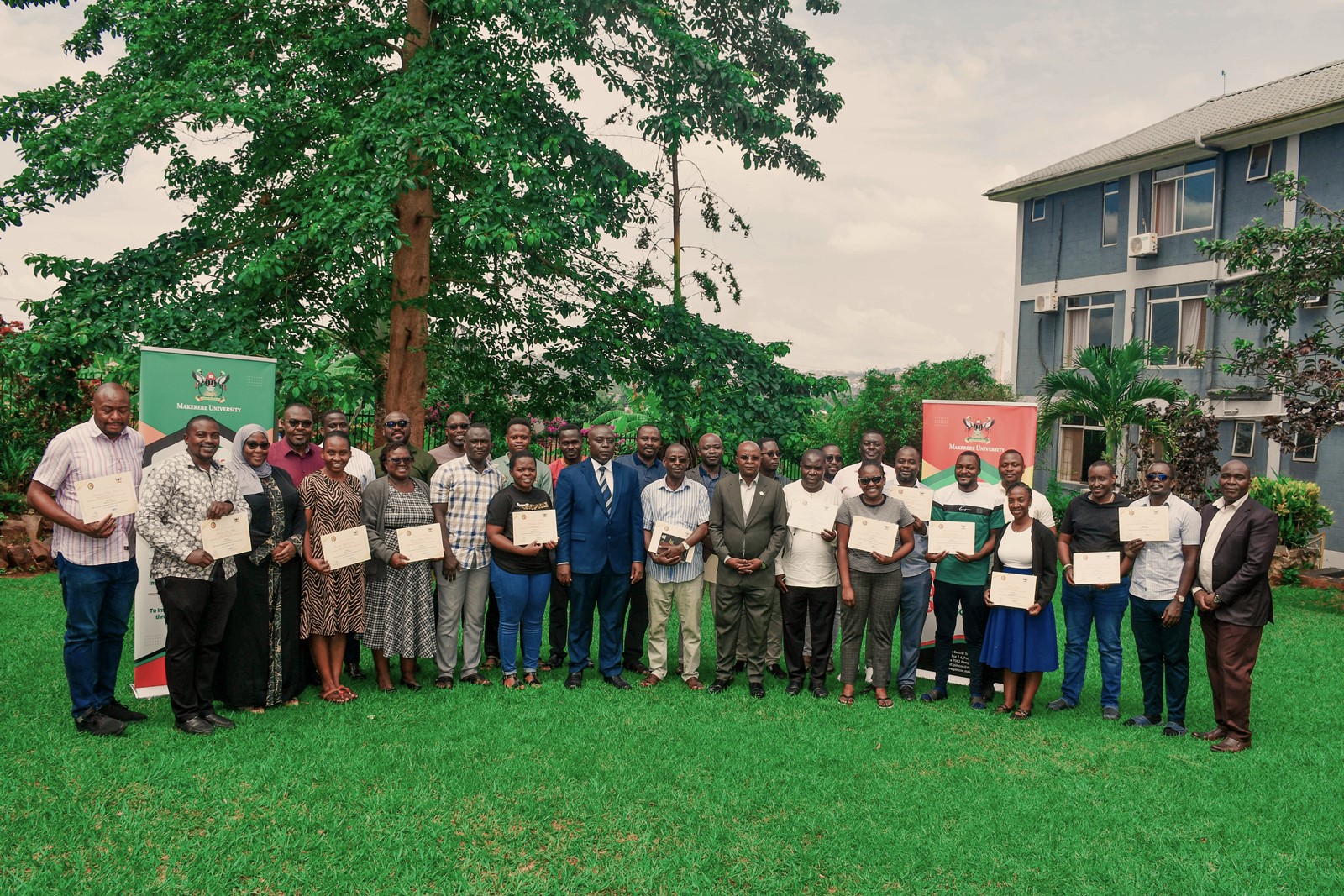
Thirty public officers from various Ministries, Departments and Agencies (MDAs) have successfully completed a two-week intensive training in Integrated Regulatory Cost-Benefit Analysis (IRCBA), culminating in the award of certificates at a closing ceremony held on 27th February 2026 at the Pearl on the Nile Hotel in Jinja.
The training was jointly organized by the Public Investment Management Centre of Excellence at Makerere University and the Ministry of Finance, Planning and Economic Development (MoFPED), in collaboration with the Infrastructure and Social Services Department (ISSD) and the National Planning Authority (NPA). It focused on operationalizing the Revised Guidelines for the Issuance of Certificates of Financial Implication (CFIs), which came into effect on 1st July 2025.
A Strategic Reform for Fiscal Credibility
In closing remarks delivered on by Commissioner Paul Patrick Mwanja behalf of the Permanent Secretary/Secretary to the Treasury, participants were commended for undertaking the training during a demanding budget cycle, when many MDAs are simultaneously preparing the FY 2026/27 Budget, executing the FY 2025/26 Budget, and implementing the National Development Plan IV and the Tenfold Growth Strategy.
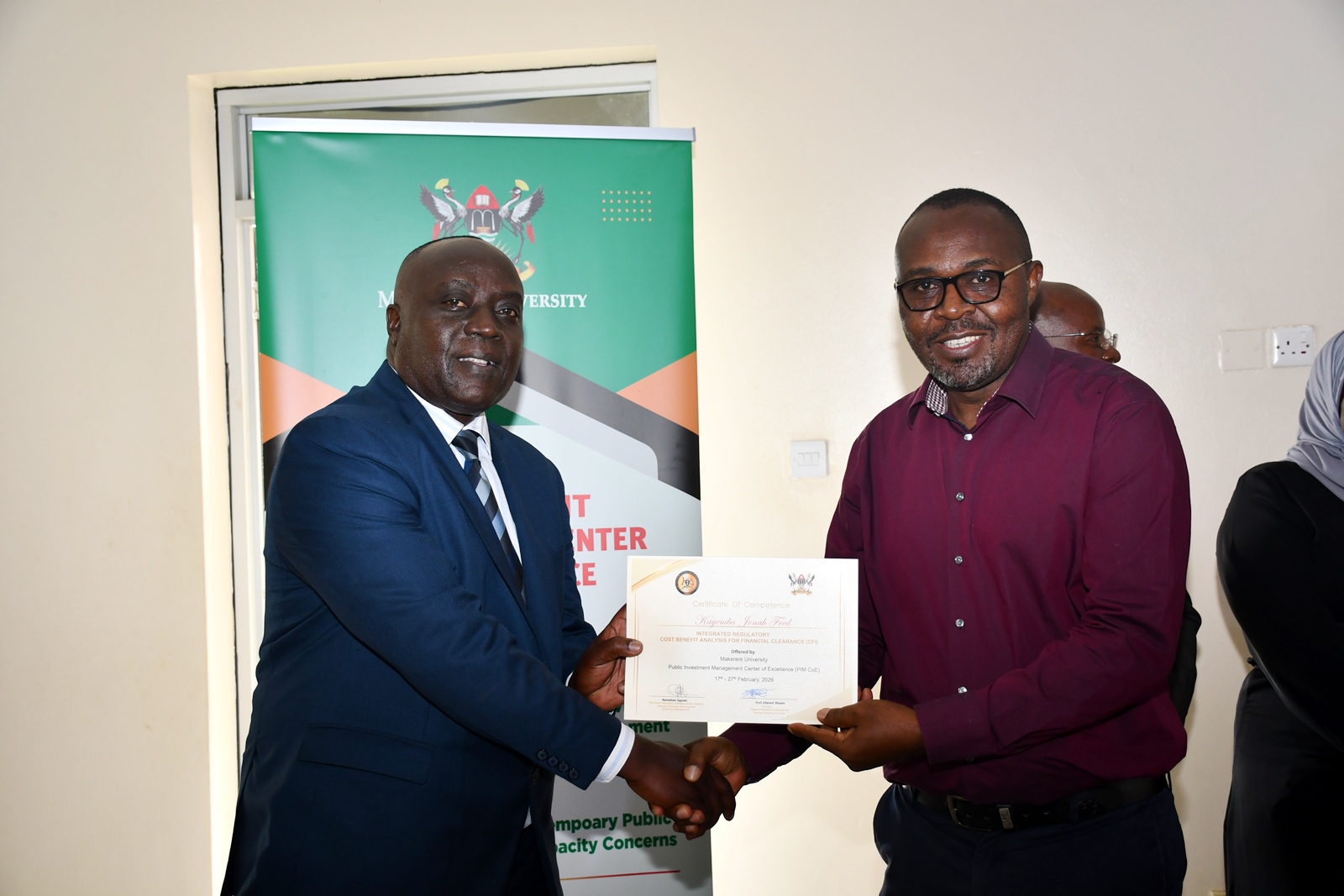
The PS/ST emphasized that the revised Guidelines mark a significant shift toward a more transparent, data-driven, consultative, and analytically rigorous approach to evaluating policy and legislative proposals. Participants were equipped to assess fiscal implications, evaluate economic and socio-economic impacts, analyze distributional effects, and address uncertainty using structured analytical tools.
They were reminded that training alone is not sufficient, the real test lies in consistent application. As members of the third cohort, they were challenged to serve as reform ambassadors, championing evidence-based policymaking and strengthening analytical standards across government.
Bridging Academia and Public Service
Delivering the official closing remarks, the Director of the PIM Centre of Excellence, Prof. Edward Bbaale, commended participants for their active engagement and unwavering commitment throughout the training.
He described the programme as both timely and strategic, designed to equip officers with practical tools to prepare robust Statements of Financial Implication (SFIs) that support credible issuance of CFIs. He noted that strong financial analysis enhances fiscal discipline, policy coherence, and the overall quality of legislation and public policy in Uganda.
Prof. Bbaale underscored the longstanding partnership between Makerere University and the Ministry of Finance, highlighting how it continues to bridge academia and public service by combining analytical rigor with practical policy experience. He emphasized that the collaborative model — bringing together faculty from the College of Business and Management Sciences and practitioners from Government, reflects the core vision of the PIM Centre of Excellence: strengthening national systems through evidence-based policymaking.
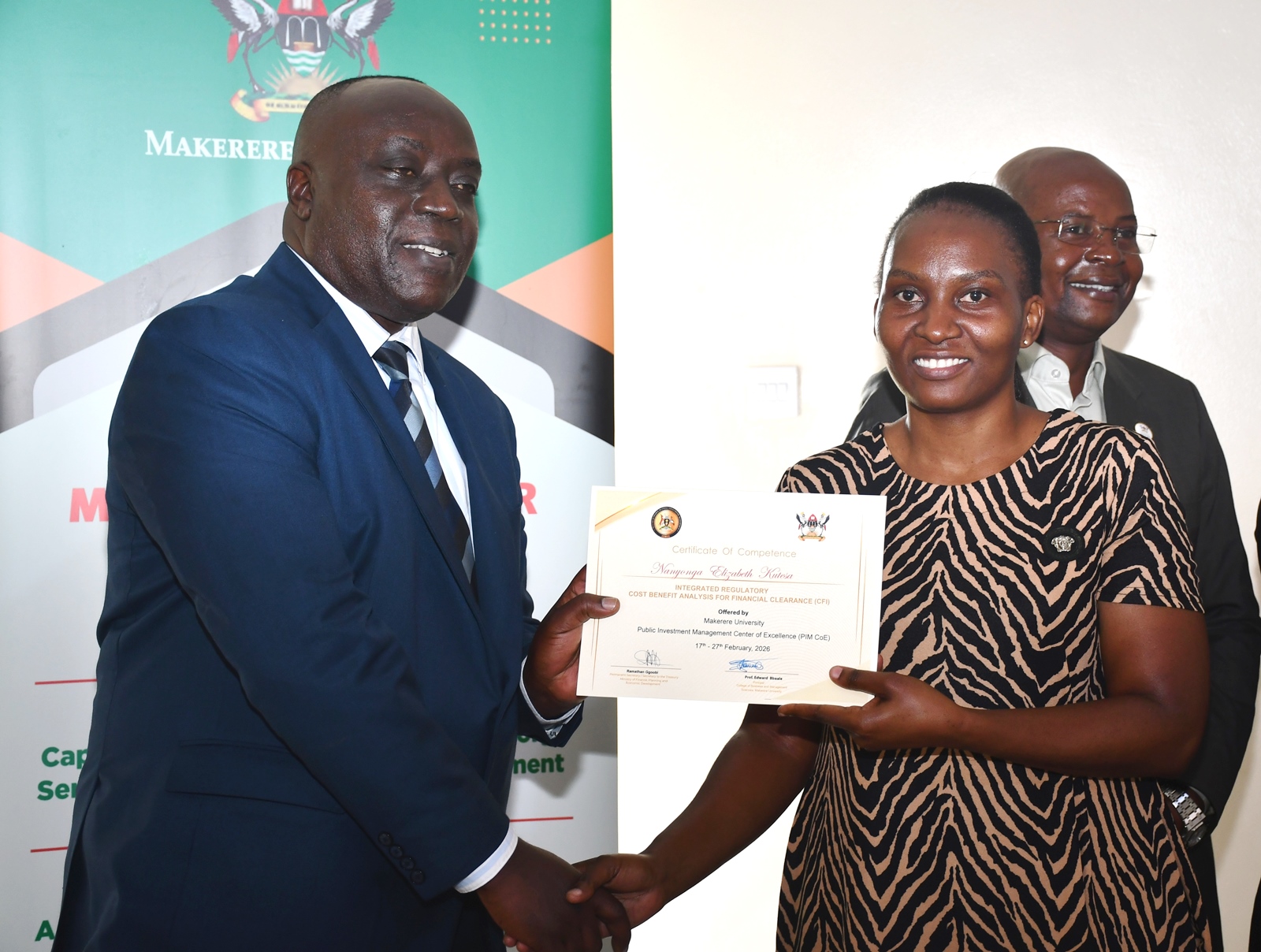
During the two weeks, participants gained hands-on experience in applying cost-benefit analysis across four critical dimensions: budgetary analysis, socio-economic analysis, distributive impacts, and risk assessment. Prof. Bbaale encouraged them to return to their institutions as agents of transformation, improving evaluation frameworks, strengthening regulatory decisions, and ensuring that public interventions deliver value for money and long-term development impact.
He also reaffirmed the Centre’s broader mandate beyond training, noting its recent support to the revision of Development Committee Guidelines, assessment of public investment performance since NDP I, and hosting of the Second Public Investment Management Conference in August 2025.”
Building from “Zero Kilometre”
Earlier, the Manager of the PIM Centre of Excellence highlighted the practical approach adopted during the training. Participants began with blank Excel sheets and built analytical models from scratch, likened to the engineering concept of starting at “zero kilometre,” where construction begins from the very starting point and progresses step by step.
The interactive sessions enabled participants from diverse disciplines, including policy analysts, planners and statisticians, to interrogate assumptions, refine costing approaches, and debate implementation and enforcement frameworks. Their sector-specific insights enriched the learning process and strengthened the analytical models developed.
The Manager noted that excellence is not about knowing everything, but about bringing together the right expertise. Facilitators from MoFPED, NPA, the Office of the President, and Makerere University ensured that theory remained grounded in practical government realities.
Participants Applaud Practical and Engaging Sessions
Speaking on behalf of the cohort, a participant described the training as highly engaging and transformative. The combination of theory and practical application, coupled with patient facilitation, allowed officers from varied professional backgrounds to learn from one another.
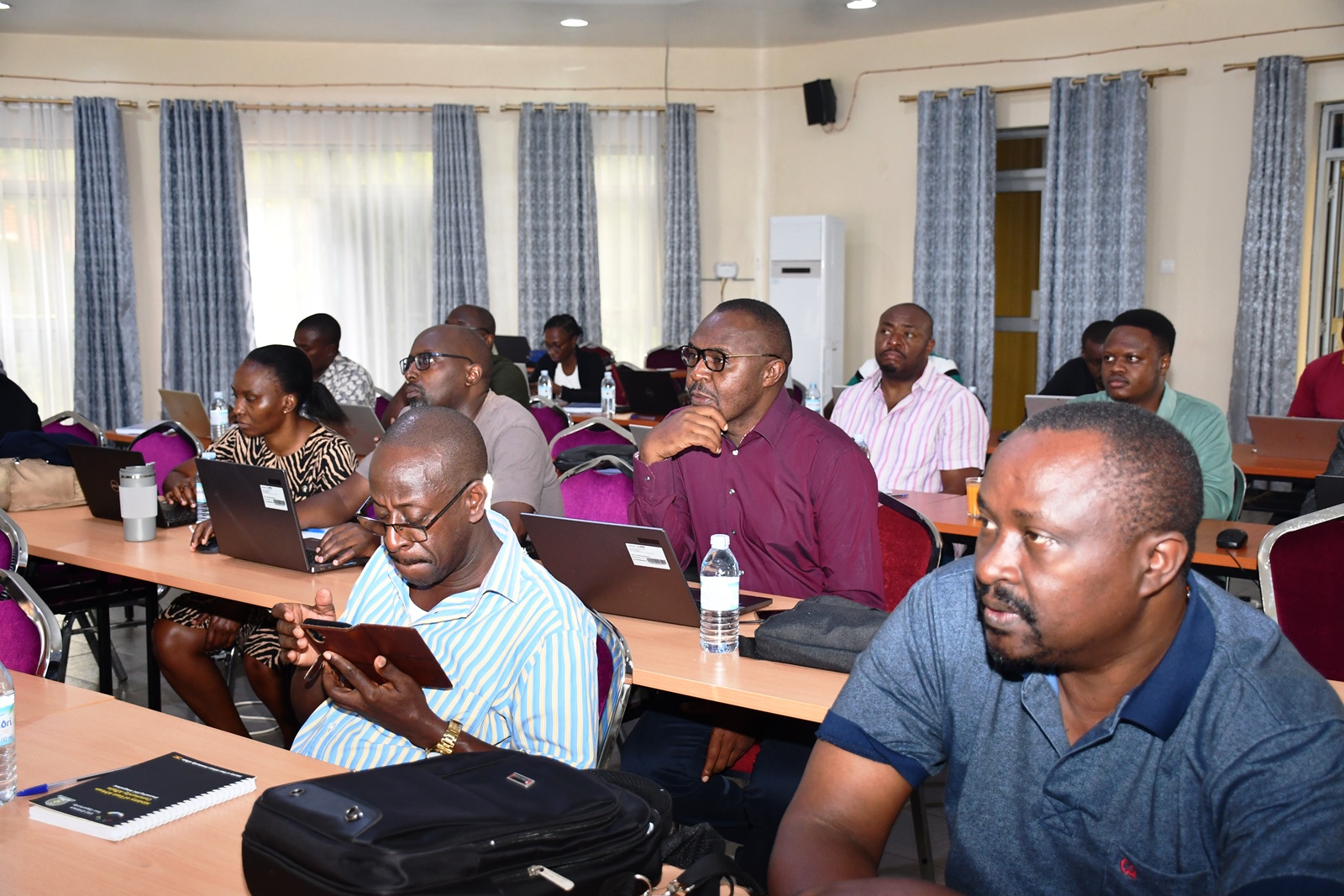
The participant highlighted the final day’s discussions as the most impactful, expressing confidence that the knowledge gained would enhance policy analysis and improve the quality of programmes and projects across MDAs.
Certificates Awarded
The ceremony concluded with the award of certificates to all 30 participants in recognition of their successful completion of the IRCBA training. The certification marks another milestone in Government’s effort to build a critical mass of experts capable of institutionalizing rigorous financial and economic analysis in public policy processes.
As the workshop was formally declared closed, participants were encouraged to apply their newly acquired skills consistently, mentor colleagues, and contribute to strengthening fiscal governance across Government.
The PIM Centre of Excellence reaffirmed its commitment to continuous research, policy advisory support, and capacity building as Uganda advances toward more credible, transparent, and sustainable public decision-making.
Business & Management
Botswana Delegation Visits Makerere’s Public Investment Management Centre to Study Sustainable Training Model
Published
1 day agoon
March 3, 2026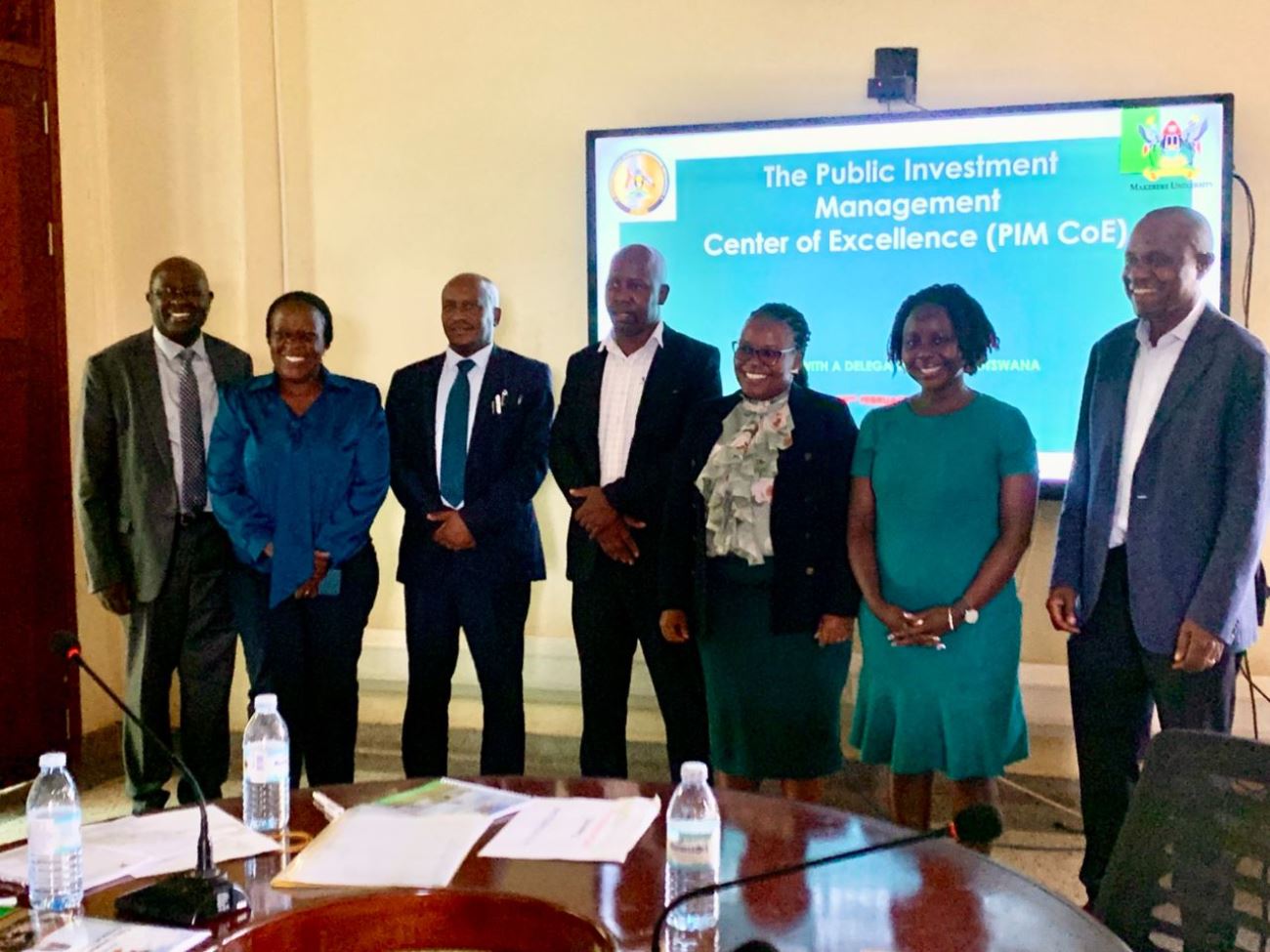
Kampala, Uganda – 25 February 2026
A delegation from Botswana’s public investments sector on 25th February 2026 visited Makerere University’s Public Investment Management Centre of Excellence to benchmark its sustainable training model and draw lessons from Uganda’s well-established Public Investment Management (PIM) framework.
The team, composed of specialists in public investments, is exploring ways to strengthen capacity within Botswana’s public sector institutions. The delegation underscored the importance of structured and sustainable capacity-building programmes, noting that effective public investment management is central to driving national development and ensuring value for money in public projects.
During the engagement, the Botswana team sought to understand the Centre’s operational model, including how it designs and delivers training programmes that remain impactful over time. Particular interest was placed on the Centre’s approach to sustainable training delivery, the documentation of challenges and successes, and mechanisms used to ensure that public officers acquire long-term, practical skills that translate into improved project planning, appraisal, and implementation.
The visiting delegation commended Uganda’s commitment to institutionalizing PIM training and emphasized that cross-country learning is vital for strengthening public financial management systems across Africa. They observed that Uganda’s experience offers practical insights into building a resilient and responsive PIM framework anchored in continuous professional development.
As part of their recommendations, the delegation proposed the introduction of a hybrid training model to enhance accessibility for international participants. Under this approach, the theoretical components of PIM courses would be delivered online, allowing participants to engage remotely from Botswana and other countries. This would then be followed by in-person sessions in Uganda focused on hands-on, experiential learning at the Centre.
According to the delegation, such a model would significantly reduce travel costs and time while preserving the value of face-to-face practical training. The hybrid approach would also provide flexibility for busy public officers, enabling them to balance professional responsibilities with structured learning.
The visit further strengthened regional collaboration and reaffirmed the role of Uganda’s Public Investment Management Centre of Excellence as a hub for capacity development in public investment management across the continent.
Business & Management
76th Graduation Ceremony: CoBAMS Staff and Graduates Win Excellence Awards
Published
6 days agoon
February 26, 2026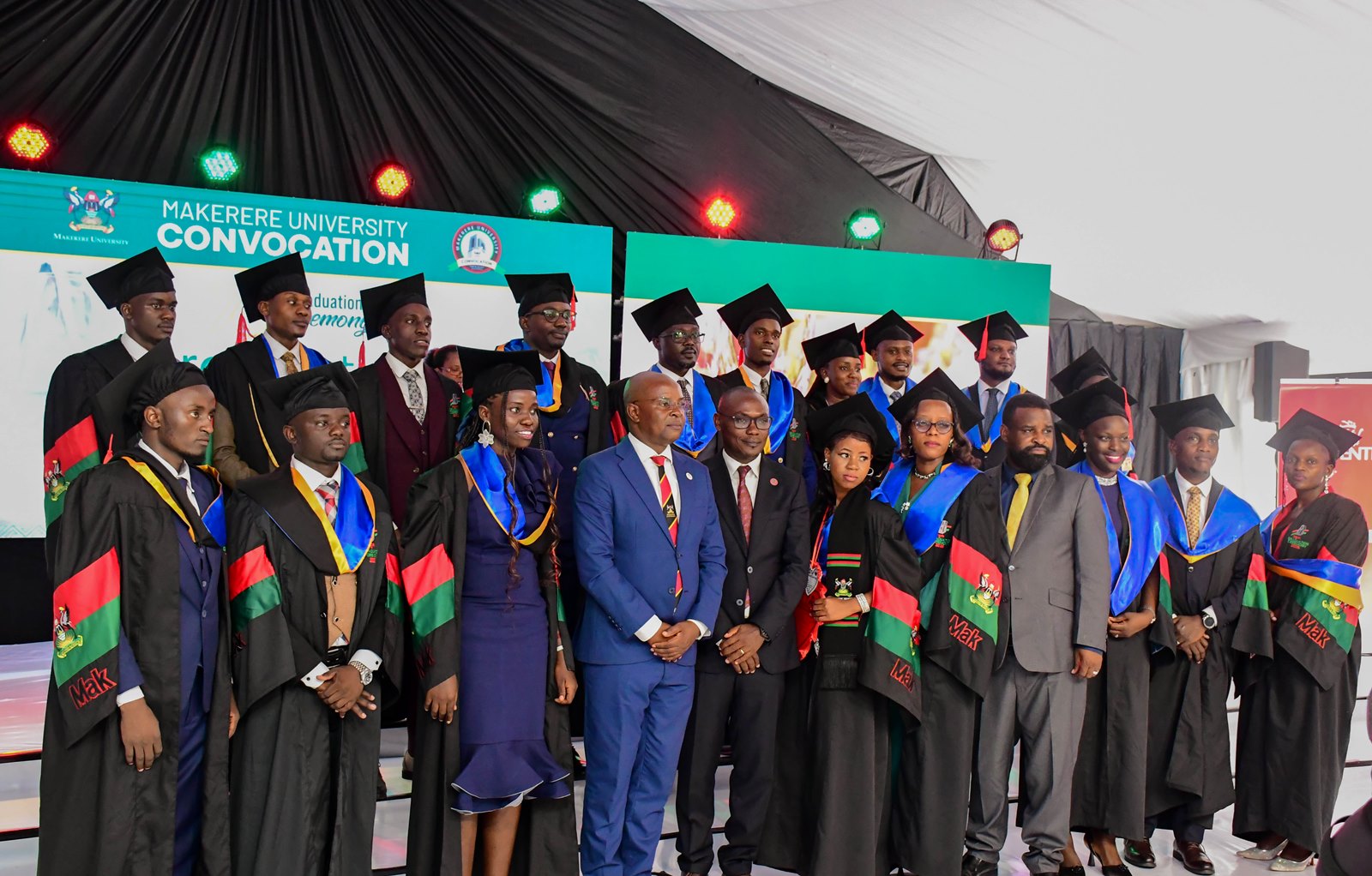
26th February 2026-During the 76th Graduation Ceremony (24th to 27th February 2026), Makerere University invoked its tradition of recognizing outstanding performance and excellence in academics, research, teaching, knowledge transfer, publication and authorship.
The College of Business and Management Sciences (CoBAMS) presented students for graduation on the third day of the 76th graduation ceremony. Consequently, on 26th February 2026, entities within the University namely the Office of the Vice Chancellor, Makerere University Press, the Directorate of Research, Innovations and Partnerships, Directorate of Graduate Training, and partners including the Economic Policy and Research Centre (EPRC), Association of Chartered Certified Accountants (ACCA Uganda), Prudential Uganda, lined up awards, to celebrate achievements and excellence.
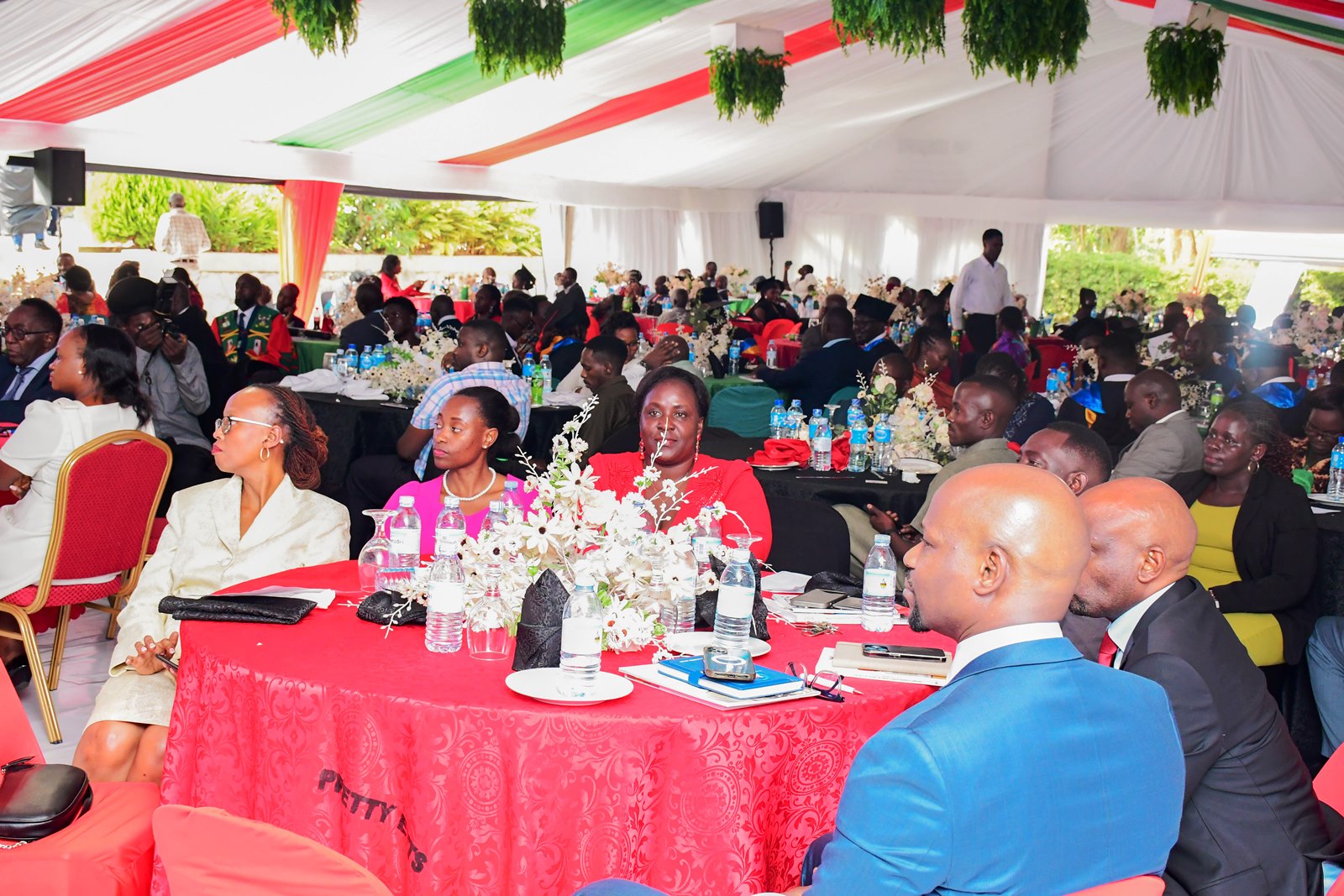
The award ceremony brought onboard invited guests from public and private sectors, the business community, Makerere University officials, faculty members, alumni, industry partners and graduating students. The awards were presented during the Makerere University Convocation Graduation Luncheon.
The ceremony provided a platform for celebrating academic excellence, strengthening alumni engagement, and reinforcing collaboration between the University and its professional and industry partners.
2026 Research Excellence Awards
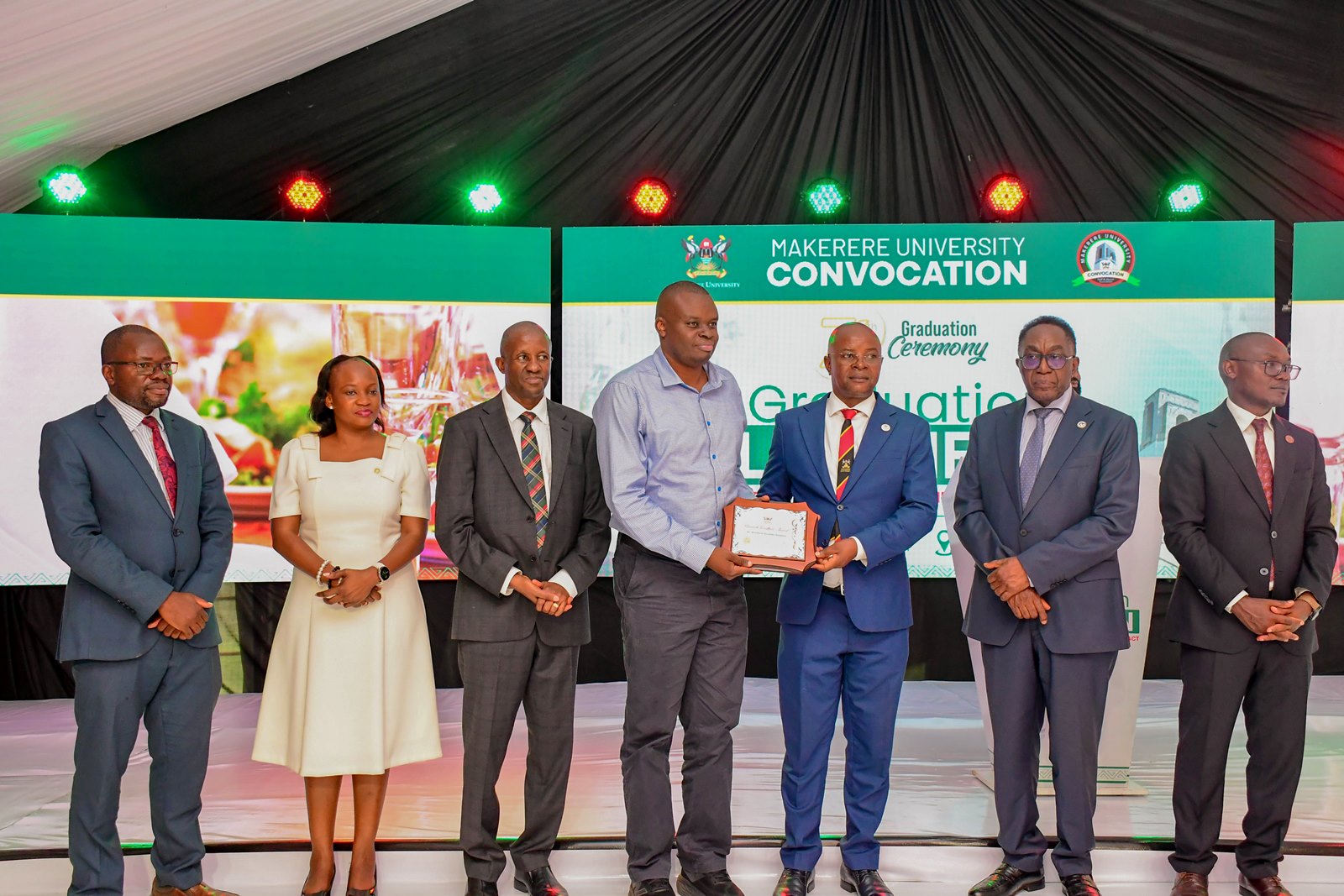
The Vice Chancellor’s Research Excellence Awards were presented to college members whose research output and scholarly contributions have significantly advanced knowledge and strengthened the College’s academic profile.
At CoBAMS, the recipients of the Vice Chancellor’s Research Excellence Awards in the various categories included the following:
- Associate Professor Faisal Buyinza, Overall top research award
- Associate Professor Faisal Buyinza, Senior-Career Research award
- Stephen Ojiambo Wandera, Mid-Career Research award
- Ruth Mpirirwe and Richard Ssempala, Early-Career Research award
The awardees were honored for their exceptional research productivity, impactful publications, and contribution to building a vibrant research culture.
The awards underscore Makerere University’s emphasis on high-quality research that addresses national and global development challenges.
Recognition of Book Author
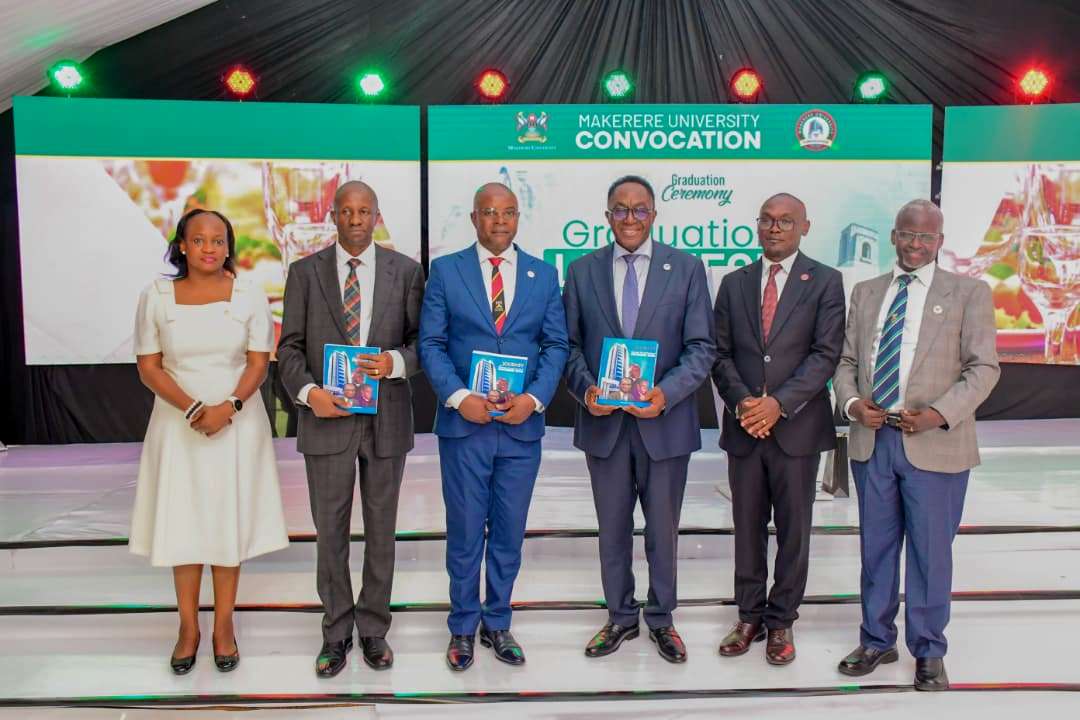
Prof. John Ddumba-Ssentamu, a renowned economist, administrator, former Vice Chancellor of Makerere University, and the pioneer Principal of the College of Business and Management Sciences, was honoured for his contribution to scholarship and knowledge transfer through authorship.
Published by Makerere University Press, Prof. Ddumba-Ssentamu’s book titled, The Journey: Beginnings, Trials and Triumphs of Centenary Bank, highlights the evolution, resilience, and growth of Centenary Bank and reflects his continued contribution to academic literature and thought leadership in the fields of economics and financial development.
Prof. Ddumba-Ssentamu’s recognition reflects the University’s appreciation of distinguished scholars whose published works contribute to intellectual discourse, policy engagement, and the advancement ofscholarship.
Reputable partners recognize excelling graduates
ACCA Uganda- Best Accounting Student
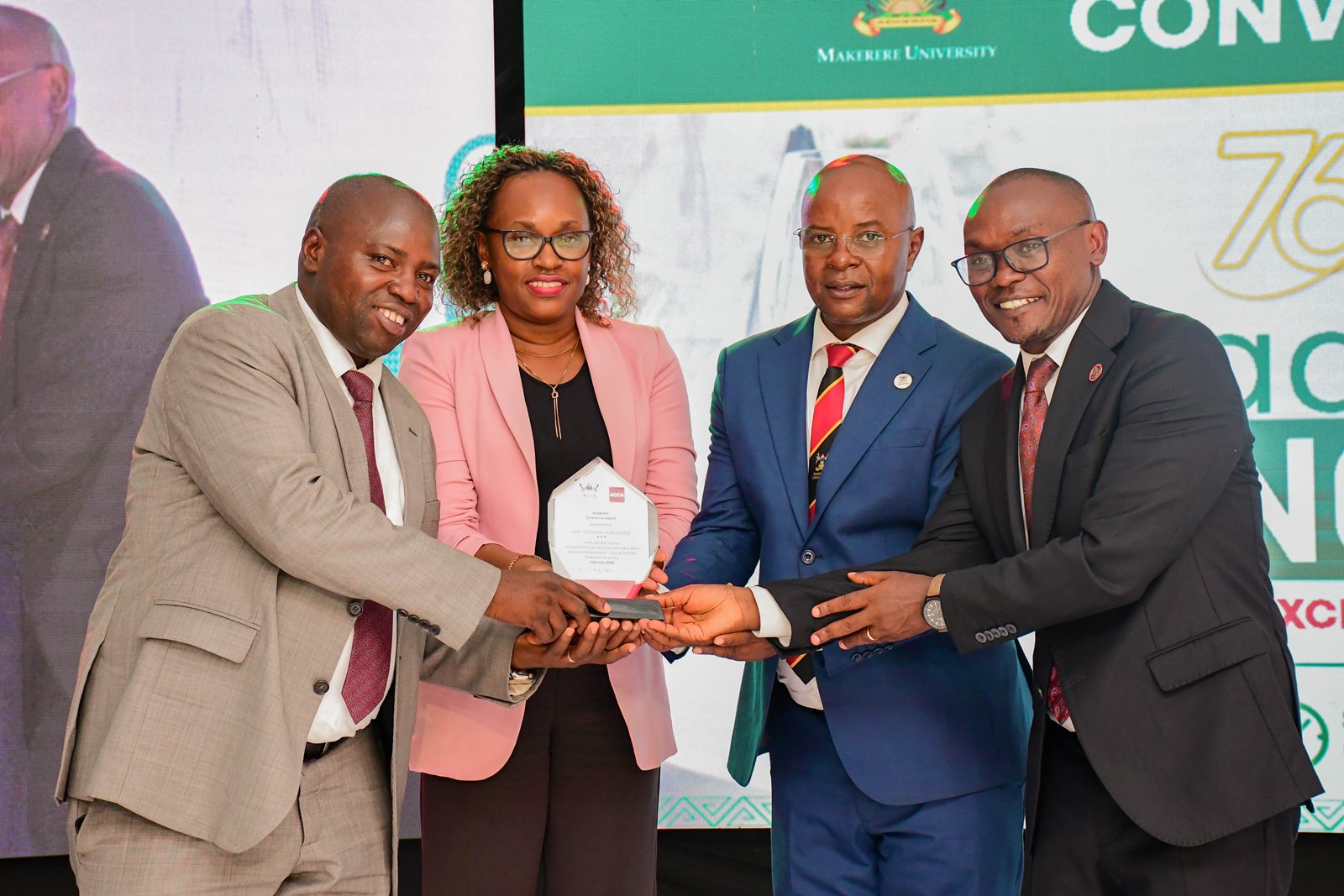
Prudential Uganda-Actuarial Science Award
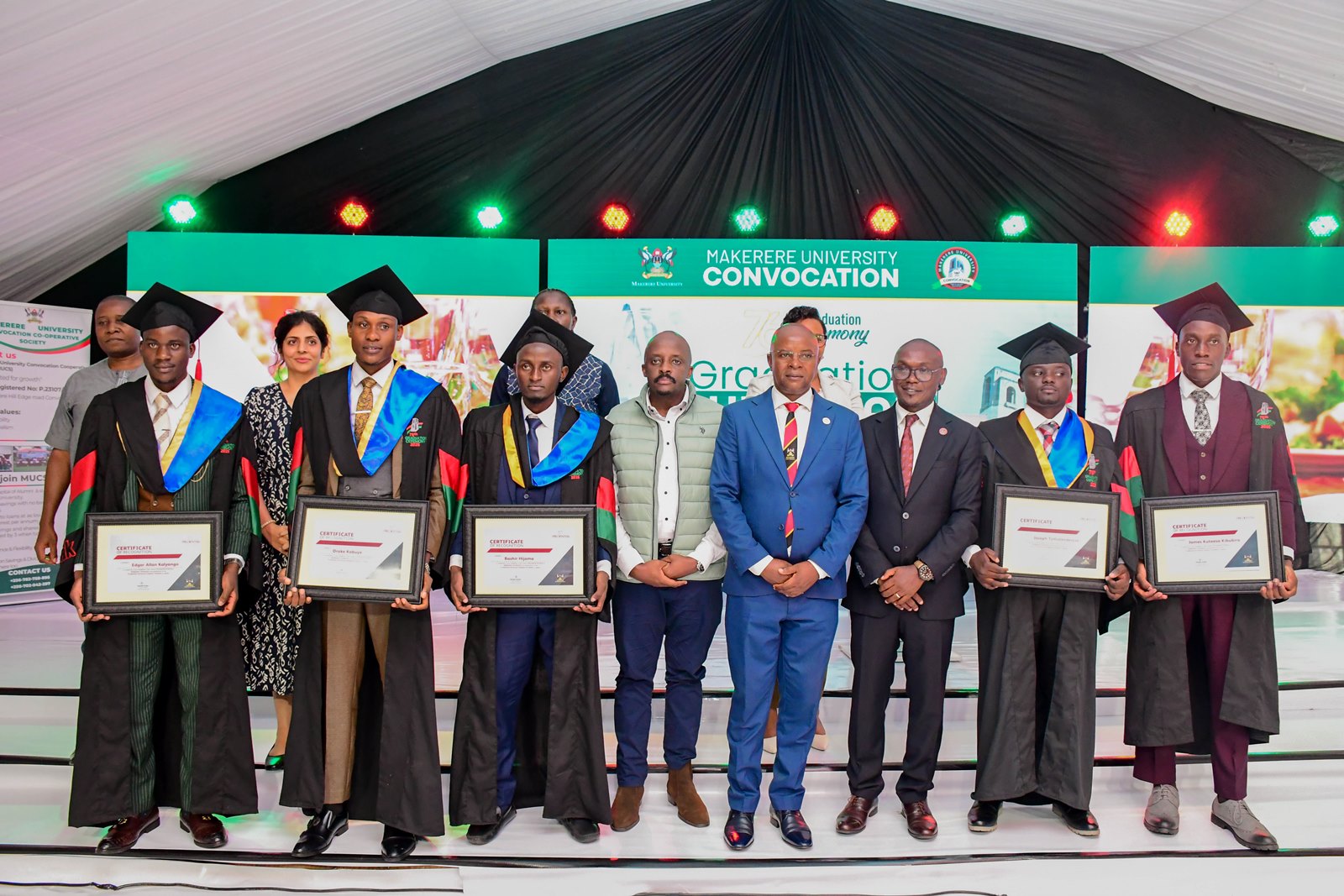
Celebrating academic excellence, Prudential Uganda recognized the fourth cohort of outstanding actuarial science graduates under the Prudential Actuarial Science Support Scheme (PASS). The initiative reflects Prudential’s long-term commitment to building local actuarial expertise and strengthening Uganda’s financial services sector for generations to come.
The top five graduates of Bachelor of Science in Actuarial Science who received the PASS awards included: Drake Kabuye, Edgar Allan Kalyango, Kuteesa Kikubira James, Tumutendereze Joseph, and Bashir Hijoma. These were honored for their outstanding academic performance and commitment to actuarial career. Through PASS, Prudential Uganda provides high-potential graduates with mentorship, internship opportunities, and guidance toward globally recognized actuarial qualifications.
Commenting on the milestone, Tetteh Ayitevie, CEO of Prudential Uganda, said that investing in actuarial talent is critical to building a resilient and sustainable financial services industry. He noted that actuaries play a central role in risk management, pricing, product development, and long-term financial planning, making their contribution vital to the growth of Uganda’s insurance sector.
Prof. Edward Bbaale, the Principal, College of Business and Management Sciences, applauded Prudential Uganda for its ongoing support, highlighting that programmes such as PASS inspire students to excel academically while preparing them for the realities and demands of the actuarial profession.
EPRC Young Professional Award
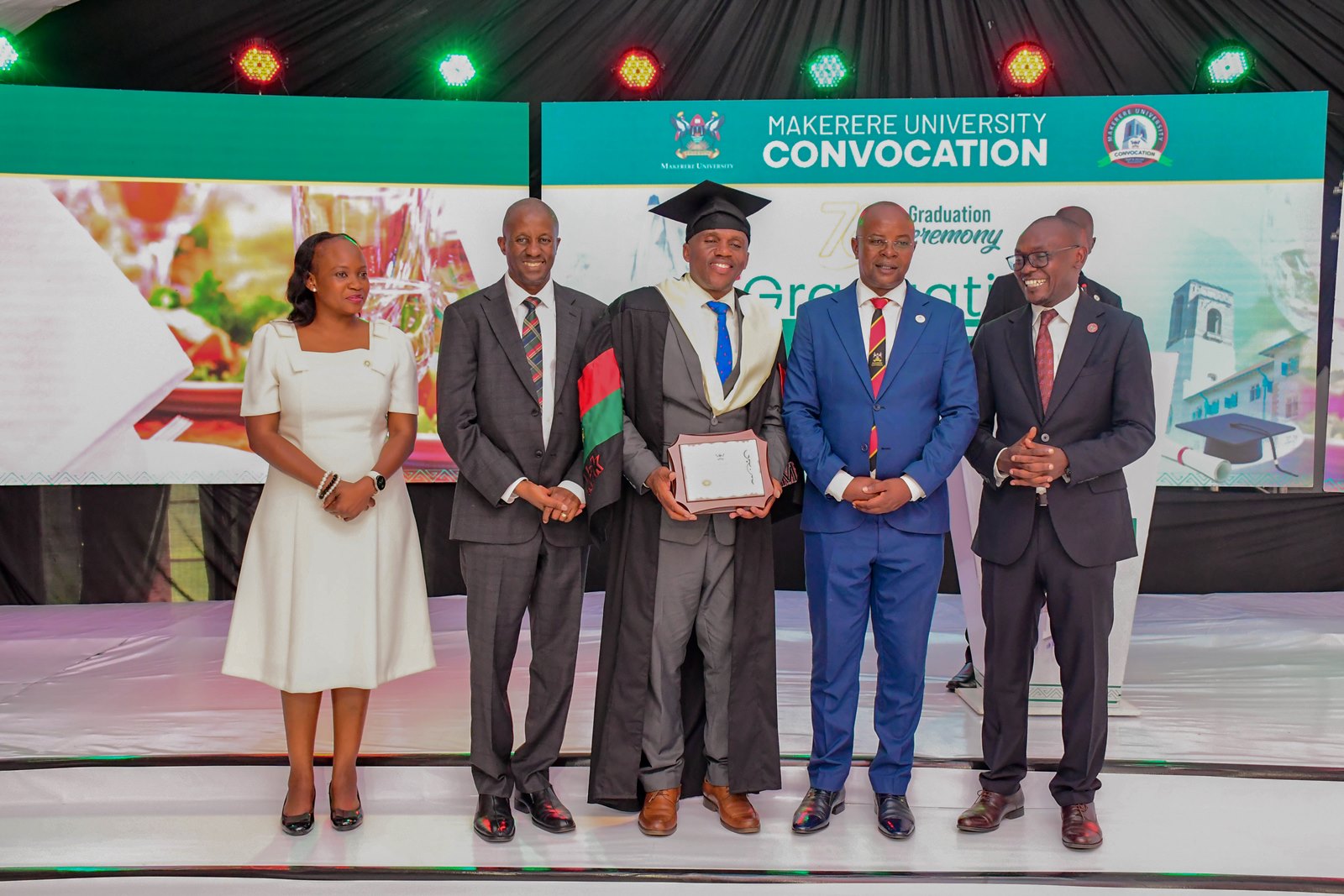
Recognizing excellence, EPRC presented the Young Professional award to Emmanuel Menya, the best Master of Arts in Economics graduate. The award includes a two-year employment contract. Ibrahim Kasirye, the Director of Research at EPRC presented the award on behalf of Dr. Sarah Ssewanyana, the Executive Director.
The EPRC Young Professional Award, recognizes and celebrates exemplary performance. The award underscores the importance of nurturing young professionals who exhibit excellence, innovation, and a strong commitment to national development.
Significance of the Award ceremony
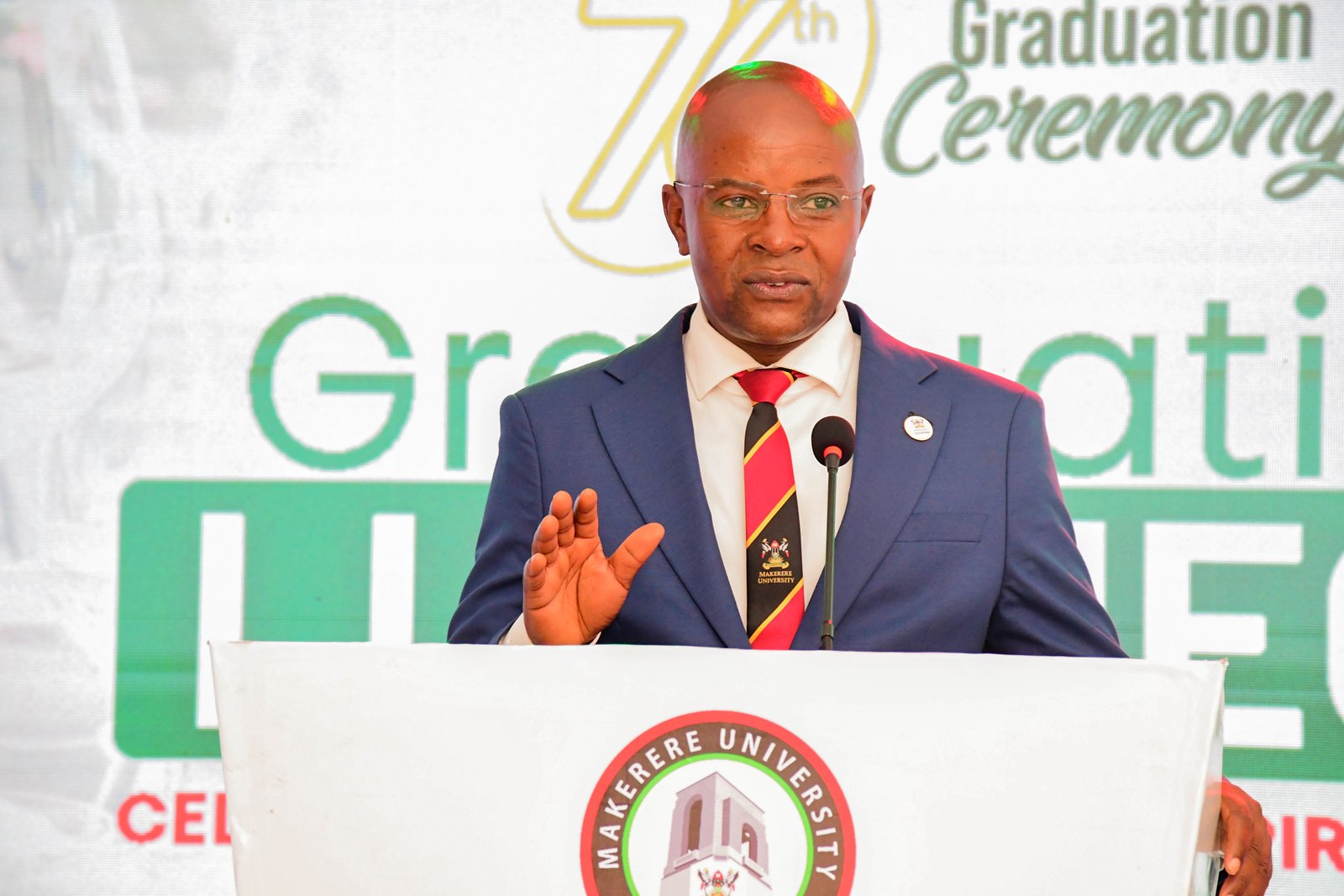
Prof. Edward Bbaale, Principal of College of Business and Management Sciences (CoBAMS), underscored the significance of the ceremony, noting that it served three key purposes: to recognize academic excellence among students, to honor faculty members excelling in teaching, research, and service, and to celebrate Prof. John Ddumba-Ssentamu, former Vice-Chancellor of Makerere University, for his continued contribution to scholarship through authorship.
Prof. Bbaale described Prof. Ddumba-Ssentamu’s ongoing scholarly work as inspirational, stating that it demonstrates a steadfast commitment to knowledge creation beyond leadership roles. He commended both students and staff for their hard work and discipline, emphasizing that university success is a shared achievement.
Collaboration, Responsibility, and Excellence
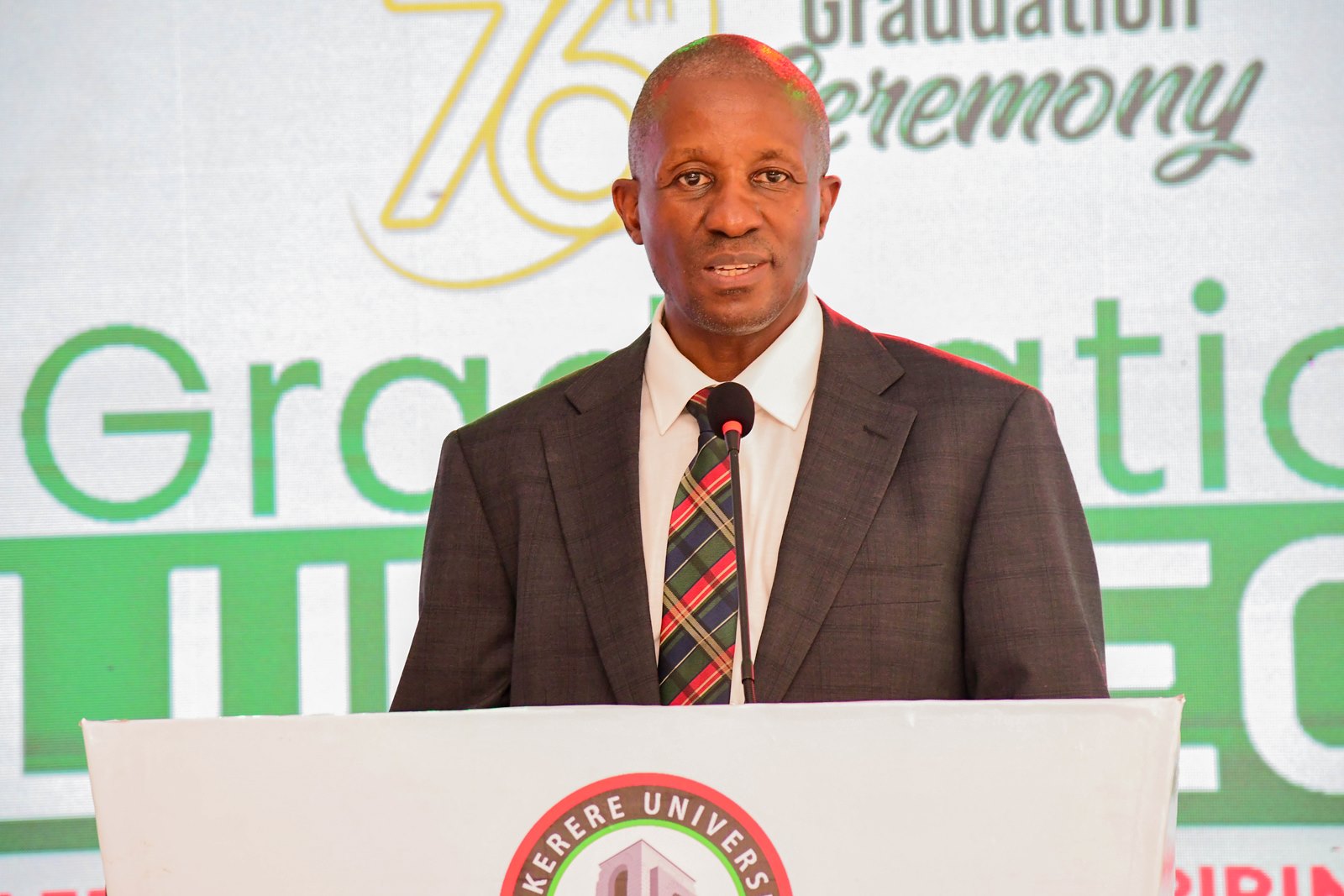
Congratulating the awardees, the Principal of Makerere University Business School (MUBS), Prof. Moses Muhwezi, reminded graduates that being a product of Makerere University is both a privilege and a responsibility.
“Uphold the university’s internationally respected brand, defend it, and take pride in it, while maintaining unity and avoiding internal conflicts that could harm its reputation,” he urged. The Principal of MUBS encouraged graduates to remain committed, diligent, and focused in their pursuit of excellence.
Highlights about Makerere University Convocation
CPA George Mugabi Turyamureeba, Chairperson of the Makerere University Convocation, informed the audience, that the Convocation is a legally established and influential platform for alumni and staff.
Rallying alumni and staff to join Makerere University Convocation, CPA Turyamureeba outlined the achievements and ongoing activities. He reported that during his tenure, the Convocation Executive, had expanded and beautified the permanent home for the Convocation. Some of the ongoing activities include: strengthening alumni engagement, introduction of a cross-generational mentorship program, and the formation of a cooperative society (SACCO) aimed at providing affordable loans and potentially establishing a bank.
He tipped the fresh graduates on resilience, continuous self-improvement, and lifelong learning, stressing the importance of staying connected to their alma mater and the Makerere University Convocation community.
He cautioned the graduates on emerging fraud risks, including digital scams, and fraudulent job offers. He urged them to safeguard their personal information, uphold integrity, and avoid becoming either victims or perpetrators of fraud.
Trending
-

 Humanities & Social Sciences1 week ago
Humanities & Social Sciences1 week agoMeet Najjuka Whitney, The Girl Who Missed Law and Found Her Voice
-

 General1 week ago
General1 week ago76th Graduation Highlights
-

 Agriculture & Environment2 weeks ago
Agriculture & Environment2 weeks agoUganda Martyrs Namugongo Students Turn Organic Waste into Soap in an Innovative School Project on Sustainable Waste Management
-

 Health2 weeks ago
Health2 weeks agoMakerere University School of Public Health Graduates First Cohort of Cost-Effectiveness Analysis Short Course
-

 Agriculture & Environment1 week ago
Agriculture & Environment1 week agoCAES Presents Overall Best Performing Student in the Sciences & a Record 28 PhDs at the 76th Graduation Ceremony
